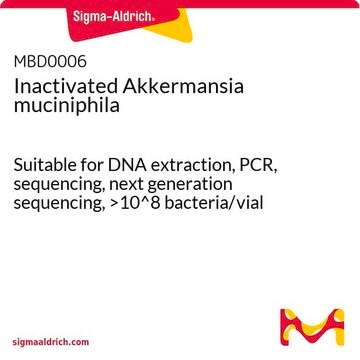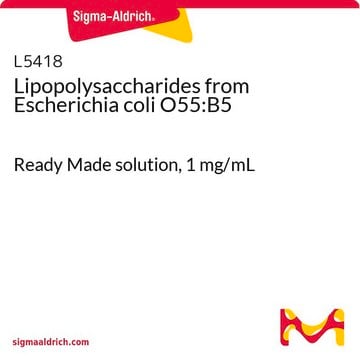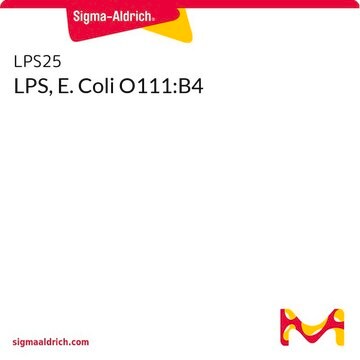推荐产品
生物源
(Akkermansia muciniphila)
品質等級
形狀
lyophilized powder
顏色
white to faint yellow
溶解度
water: 1 mg/mL, faintly hazy to hazy, colorless to light yellow
儲存溫度
2-8°C
相关类别
一般說明
Akkermansia muciniphila (A. muciniphila) is a Gram-negative, anaerobic, non-motile, non-spore-forming, and oval-shaped bacterium. A. muciniphila inhabits the gastrointestinal tracts of more than 90% of adults and constitutes 1-4% of the fecal microbiota. A. muciniphila levels were suggested to serve as a biomarker for a healthy intestine.
Lipopolysaccharides (LPS) are complex molecules composed of lipids and polysaccharides that are predominantly found in the outer membrane of Gram-negative bacteria. They consist of three main components: lipid A, the core oligosaccharide (core), and the O-specific polysaccharide or O antigen (OAg). Lipid A is firmly linked to the outer bacterial membrane and is primarily responsible for the toxicity associated with LPS. LPS serves as a potent activator of the proinflammatory response in various types of mammalian cells, including macrophages, monocytes, and endothelial cells. Beyond its protective role for Gram-negative bacteria against environmental stress, LPS is also recognized by the innate immune system during infection.
應用
Lipopolysaccharides may have been used as a cell culture treatment:
- to impair barrier functions of Caco-2 cell monolayers tight junction
- cocultured along with A. muciniphila to study its effects on the NLR family pyrin domain containing 3 (NLRP3) expressions in Raw264.7 cells
- to activate HepG2 cells as an endotoxin together with palmitic acid (PA)
生化/生理作用
LPS and its lipid A moiety stimulate cells of the innate immune system by the Toll-like receptor 4 (TLR4), a member of the Toll-like receptor protein family, which recognizes common pathogen-associated molecular patterns (PAMPs).,
A. muciniphila degrades mucus and utilizes it as a carbon/nitrogen source. Consequently, the host produces additional mucus while the bacterium produces oligosaccharides and Short Chain Fatty Acids (SCFAs) that can be utilized by the host and trigger the immune system. An additional protective effect of the SCFA is stimulation of mucus-associated microbiota growth, that serves as a barrier against penetration of pathogens to intestinal cells.,
A. muciniphila was crowned as the next-generation beneficial microbe. Several reports have indicated that A. muciniphila affects glucose metabolism, lipid metabolism, and intestinal immunity. In addition, decreasing levels of A. muciniphila are related to the development of some diseases such as metabolic disorders and inflammatory diseases (obesity, type 2 diabetes, inflammatory bowel disease (IBD), autism and atopy. Weir et al. found a correlation between low level of A. muciniphila and colorectal cancer. Shigemetzu Y et al. found that A. muciniphila acts as a regulator of the response to PD-1 blockade which is used for anti-cancer immunotherapy. A. muciniphila induce dendritic cells to secrete IL-12, that is a critical component of the anti-cancer effect of PD-1 blockade.
LPSs from A. muciniphila stimulate NF-κB dependent secreted embryonic cell alkaline phosphatase (SEAP) production via TLR4. In addition, it induces IL-8, IL-6 and minimal amounts of IL-10 and TNF-α in peripheral blood mononuclear cells (PBMCs). A. muciniphila stimulation of IL-8 production by enterocytes was shown to be significantly (100 fold) lower than E. coli stimulation. Low proinflammatory activity keep the mucosa-associated immune system alerted at an appropriate level for generation of mucosal homeostasis.
A. muciniphila degrades mucus and utilizes it as a carbon/nitrogen source. Consequently, the host produces additional mucus while the bacterium produces oligosaccharides and Short Chain Fatty Acids (SCFAs) that can be utilized by the host and trigger the immune system. An additional protective effect of the SCFA is stimulation of mucus-associated microbiota growth, that serves as a barrier against penetration of pathogens to intestinal cells.,
A. muciniphila was crowned as the next-generation beneficial microbe. Several reports have indicated that A. muciniphila affects glucose metabolism, lipid metabolism, and intestinal immunity. In addition, decreasing levels of A. muciniphila are related to the development of some diseases such as metabolic disorders and inflammatory diseases (obesity, type 2 diabetes, inflammatory bowel disease (IBD), autism and atopy. Weir et al. found a correlation between low level of A. muciniphila and colorectal cancer. Shigemetzu Y et al. found that A. muciniphila acts as a regulator of the response to PD-1 blockade which is used for anti-cancer immunotherapy. A. muciniphila induce dendritic cells to secrete IL-12, that is a critical component of the anti-cancer effect of PD-1 blockade.
LPSs from A. muciniphila stimulate NF-κB dependent secreted embryonic cell alkaline phosphatase (SEAP) production via TLR4. In addition, it induces IL-8, IL-6 and minimal amounts of IL-10 and TNF-α in peripheral blood mononuclear cells (PBMCs). A. muciniphila stimulation of IL-8 production by enterocytes was shown to be significantly (100 fold) lower than E. coli stimulation. Low proinflammatory activity keep the mucosa-associated immune system alerted at an appropriate level for generation of mucosal homeostasis.
其他說明
For additional information on our range of Biochemicals, please complete this form.
To gain a comprehensive understanding of our extensive range of Lipopolysaccharides for your research, we encourage you to visit our Carbohydrates Category page.
訊號詞
Danger
危險聲明
危險分類
Acute Tox. 2 Oral
儲存類別代碼
6.1A - Combustible acute toxic Cat. 1 and 2 / very toxic hazardous materials
水污染物質分類(WGK)
WGK 3
閃點(°F)
Not applicable
閃點(°C)
Not applicable
Akkermansia muciniphila in the Human Gastrointestinal Tract: When, Where, and How?
Geerlings SY, Kostopoulos I, de Vos WM, Belzer C.
Microorganisms, 6(3), 75-75 (2018)
Analysis of Lipopolysaccharides of Gram-Negative Bacteria.
Mayer H, Tharanathan RN, Weckesser J.
Methods in Microbiology, 18, 157-207 (1985)
Mucolytic bacteria with increased prevalence in IBD mucosaaugment in vitro utilization of mucin by other bacteria.
Png CW, Linden SK, Gilshenan KS, Zoetendal EG, McSweeney CS, Sly LI, McGuckin MA, Florin TH.
The American Journal of Gastroenterology, 105(11), 2420-2428 (2010)
Microbes inside?from diversity to function: the case of Akkermansia.
Blezer C and DE Vos WM.
The ISME Journal, 6(8), 1449-1458 (2012)
Siwen Qu et al.
Microbiology spectrum, 9(2), e0073021-e0073021 (2021-10-07)
Akkermansia muciniphila has been proved to play a crucial role in the progression of colitis, but its underlying mechanism remains inconclusive. In this study, we aim to investigate the effect of A. muciniphila on the development of acute colitis and
商品
Explore the structure, function, and diverse applications of Lipopolysaccharides. Discover their role in bacteria, serological specificity, and research potential.
我们的科学家团队拥有各种研究领域经验,包括生命科学、材料科学、化学合成、色谱、分析及许多其他领域.
联系技术服务部门





